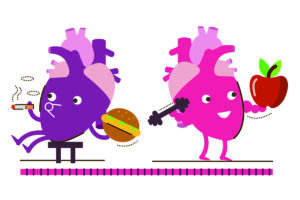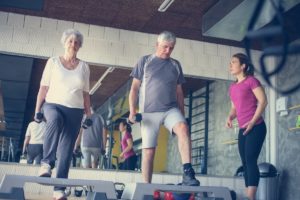Chronic Diseases
Obesity and Cancer Risks in Young Adults
Recent findings reveal a trend toward increased risk for obesity-related cancers among young American adults. The study, published in The Lancet, found significant increases in six of 12 obesity-related cancers in young adults, with even greater rises in successively younger generations. Compared with people born 1945-1954, for example, those born 1980–1989 had double the risk . . . at the same age.
Eat Well, Breathe More Easily
If the eyes are a window to the soul, then the lungs are a door to the body—providing a gateway for the arrival of oxygen to every living cell.
Yo-Yo Dieting Tied to Heart Problems
Obesity and consistently elevated blood pressure, cholesterol and blood sugar levels have long been linked to a higher risk of heart disease. But what happens when these metabolic risk factors fluctuate over time, as can happen when people flip-flop between diets? The answer may hail from a study in the journal Circulation involving a massive 6.7 million people.
Asthma and What You Eat
If the eyes are a window to the soul, then the lungs are a door to the body—providing a gateway for the arrival of oxygen to every living cell.
More Long-Term Aerobic Fitness Benefits
New research adds to growing evidence that current cardiovascular fitness levels affect heart disease risks as far ahead as 9 years in the future. “Even among people who seem to be healthy, the top 25% of the most fit individuals actually have only half as high a risk [of heart disease] as the least fit 25%,” said principal investigator Bjarne Nes, PhD, of the Norwegian University of Science and Technology, Trondheim, Norway.
Blood Pressure, Diet and Aging
It’s official: The typical Western diet is a major driver of rising blood pressure as we age, not age itself as previously thought, according to research from the Johns Hopkins University Bloomberg School of Public Health published in JAMA Cardiology. The study revealed that members of the isolated South American Yanomami tribe, with virtually no Western dietary influences, typically have no rise in their blood pressure numbers from age 1 to age 60.
How Resistance Training Affects Metabolism
Resistance training does much more than build strong muscles. Research has confirmed that resistance training affects metabolism, too.
5 Habits for Eating to Beat Diabetes
The numbers are startling: More than 100 million American adults have diabetes or prediabetes, meaning they have poor blood sugar control, which, if untreated, often leads to type 2 diabetes within a few years. It’s therefore not surprising that a great deal of research is trying to suss out how eating habits affect diabetes risk. Here’s what the white coats have uncovered of late:
Weight Training and Diabetes
At the medical clinic where I work as an exercise physiologist, a patient came to see me; let’s call him John. He was healthy, but his fasting blood glucose levels were high. He was in his mid-40s and had low muscle mass. John was not on medication and wanted to avoid it. He asked my advice.
The State of Metabolic Health
Public health may be compromised unless people shift their lifestyle choices from bad to better, according to new research. A recent study found that only 12% of American adults are “metabolically healthy,” and current trends raise a red flag on efforts to lower associated risks of type 2 diabetes, heart disease and other complications.
Inspiring Functionality
CLIENT: Erika Miller
PERSONAL TRAINER: Michele DeJesus, MS (movement therapy), PhD (nutrition)
LOCATION: Lexington Athletic Club, Lexington, Kentucky
5 Ways to Eat to Beat Diabetes
The numbers are startling: More than 100 million American adults have diabetes or prediabetes, meaning they have poor blood sugar control, which, if untreated, often leads to type 2 diabetes within a few years. It’s therefore not surprising that a great deal of research is trying to suss out how eating habits affect diabetes risk. Here’s what the white coats have uncovered of late:
Sleep Deprivation & Diabetes Risk
Did you know that losing a single night’s sleep may affect the liver’s ability to produce glucose and process insulin, increasing the risk of metabolic diseases such as hepatic steatosis (fatty liver) and type 2 diabetes?
Muscle Mass as a New Vital Sign
Fitness professionals understand the importance of building and maintaining lean body mass for functional mobility and health. New research shows that medical professionals should also be promoting this message to their patients. “Muscle mass should be looked at as a new vital sign,” said principal investigator Carla Prado, PhD, RD, associate professor at the University of Alberta, Canada. “If healthcare professionals identify and treat low muscle mass, they can significantly improve their patients’ health outcomes.
What A PURE Diet Looks Like
Perhaps a heart-healthy diet has room for steak, after all.
Boosting the Brain Health of Older Adults
Exercise is good for promoting brain health. Indeed, the right kind of exercise can protect against the natural decline of brain.
Highly Fit Women and Dementia
Middle-aged women with high cardiovascular fitness levels were almost 90% less likely to develop dementia in older age than women with moderate aerobic fitness, according to a recent study in the journal Neurology (2018; doi:
10.1212/WNL.0000000000005290).
To Fight Diabetes, Jump on the Whole-Grain Train
The numbers are startling: About 30 million Americans—more than 9% of the population—have diabetes, according to the Centers for Disease Control and Prevention. Another 84 million have prediabetes, a condition of poor blood sugar control that often leads to type 2 diabetes. But it looks like adding whole grains to our diets could reduce the disease’s collective burden.
The Optimal Amount of Exercise for Heart Health
Arterial stiffness, which increases with sedentary living, is associated with higher risk of heart disease. It’s well known that exercise can help, but how much—or how little—is enough?
“While near-daily, vigorous lifelong (>25 years) endurance exercise training prevents arterial stiffening with ageing, this rigorous routine of exercise training over a lifetime is impractical for most individuals,” noted the authors of a new study, which aimed to determine the least amount of exercise necessary to reduce arterial stiffness.
Exercise Doesn’t Slow Dementia, Say Researchers
Research has supported exercise as having the potential to keep dementia at bay or at least to impede its progression. A recent study suggests that physical activity may not be as effective at warding off cognitive decline as previously thought.
In this study, published in BMJ (2018; 361, k1675), 329 individuals were assigned to an exercise intervention, while 165 subjects received “usual care.” Average age was 77, and each participant had a clinically confirmed dementia diagnosis.



















